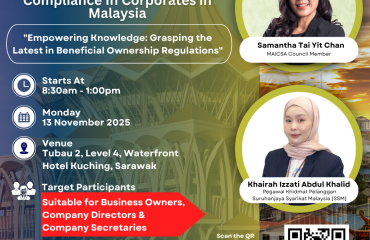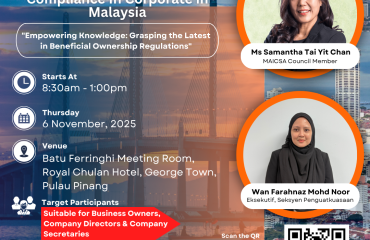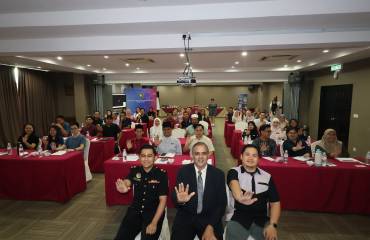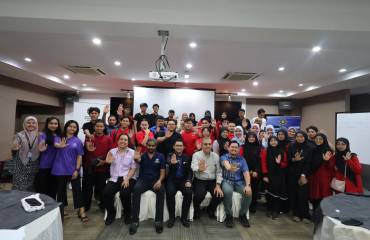28th February 2017, Kuala Lumpur – Transparency International-Malaysia (TI-M) released the findings of the 2017 Global Corruption Barometer (GCB) – Asia Pacific Region, which surveyed the public’s perceptions of corruption and the government’s effectiveness in tackling corruption. The GCB also surveyed the public’s experiences and views on corruption and their willingness to combat the issue.
21,861 people across 16 countries in the Asia Pacific Region from July 2015 to January 2017 participated in the exercise. The countries surveyed were: Australia, Korea, Japan, Cambodia, Indonesia, Thailand, Vietnam, Taiwan, Hong Kong, China, India, Pakistan, Myanmar, Sri Lanka, Malaysia and Mongolia. Interviews were conducted throughout Malaysia’s 13 states using random sampling. In total, 1009 respondents were interviewed between September 2016 and December 2016 and the gender distribution was 50% male and 50% female
Findings:
Perceptions of Corruption
With regards to the perceived level of corruption, the GCB results found that 60% of the respondents felt the level of corruption had increased and only 11% said that corruption had decreased a little. For the 2013 GCB survey, 39% of respondents felt corruption had increased. 54% of the Malaysian felt that the management of the economy is the most important problem that the Government should address. 62% of Malaysians feel that current government is handling the fight against corruption badly and 41% of Malaysians said that the Malaysian Anti-Corruption Commission is doing badly at fighting corruption. Also, 53% of Malaysian felt that the Government is ineffective in handling the fight against corruption. The institutions perceived to be involved in corruption are in Malaysia: Police (57%), Local Government and Councilors (48%), Tax officials (48%), Business Executives (46%), Government officials (45%), Representatives in Legislature (41%), Prime Minister and his officials (41%), Judges and Magistrates (33%), and religious leaders (31%). The police was noted as having the highest bribery risk and this would seriously undermine the quality and fairness of this law enforcement institution.
Incidences of Bribery
The GCB survey also touched on the experiences that some people have in accessing the following essential government services such as – education, medical/Healthcare services, registry/permit/identity services, utilities services, police and court. The top three public services which the interviewees paid a bribe in Malaysia are: police (13%), registry/permit/identity services (10%) and medical/healthcare (10%).
Bribery rate: 23% of the respondents in Malaysia have paid a bribe to access basic public services mentioned earlier and 39% of these bribe payers are 35 year old and below. Bribery rates vary considerably between countries in the Asia Pacific Region, countries with the highest bribery rates (30% and above) are Indonesia (32%), Cambodia (40%), Pakistan (40%), Myanmar (40%)), Thailand (41%), Vietnam (65%), India (69%).
Citizen’s Willingness to Report
The GCB also explores whether people feel empowered to help fight corruption and what barriers exist to discourage them from speaking out against corruption.
The following questions were asked:
- What are the most effective things ordinary people can do?
- Why don’t more people report?
- Is it socially acceptable to report corruption?
- Are people empowered to make a difference in the fight against corruption?
In Malaysia, the most effective actions to help fight corruption are “refusing to pay bribes”, “vote for candidates that are against corruption” and “reporting corruption incidents” (17 per cent, 14 per cent and 12 per cent, respectively). Worryingly, the most common reason people don’t report corruption is that they are afraid of the consequences (15 per cent). This demonstrates that fear of retaliation or a negative backlash (such as losing one’s job) is a major barrier to more people coming forward. This is the main reason cited by Malaysians. The second most common reason is that people do not know where to report corruption (12%) and nothing would be done or it would not make a difference (12%), suggesting a lack of trust in the effectiveness of reporting channels or that public officials have impunity when they commit corruption offences. There are a number of barriers to engaging more citizens in anti-corruption. Many people are afraid
of the negative consequences of blowing the whistle on graft; and indeed, this seems justified, as approximately 16% of the respondents report suffering retaliation or other negative consequences as a consequence of reporting corruption.
The survey also asks to what extent respondents feel that ordinary people can make a difference in the fight against corruption and whether they feel personally obliged to report it when they witness corruption. The result was positive for Malaysia as 55% of Malaysian felt that they can make a difference in the fight against corruption and 50% felt personally obliged to report corruption when they witness it.
Recommendations:
- TI-M calls for tougher measures to curb corruption especially for the high risk service providers : Police and Government officials (tax collectors and local government councilor)
- TI-M calls for clear commitment from all levels of government, the private sector and civil society working together to address corruption
- TI-M calls for stronger whistleblower protection so that more people are willing to take action against corruption.
- TI-M calls for Government to incorporate the Sustainable Development Goal (SDG) 16 “Promote just, peaceful and inclusive societies”. This should specifically include targets related to tackling corruption and bribery, stopping illegal financial flows within and out of the country, the enactment and implementation of right to information laws realizing peoples’ right to search, receive and impart information, and building strong institutions
- TI-M urges the Government to ensure civil society participation in the UNCAC review ensuring a transparent and inclusive process in the upcoming second Peer Review of Chapter II – Preventive Measures (Article 5 – 14) and Chapter V – Assets Recovery (Article 51 – 59).
Issued by:
Dato’ Akhbar Satar, President
Transparency International-Malaysia
DOWNLOAD THE FULL PRESENTATION OF THE GCB – GCB PPT-02







